Wahal ataaka hadeethu Moosa?
Has the Bible or the Qur'an been "corrupted"? Are there contradictions in these texts? In all honesty, if one takes a liberal stance (influenced by the philosophy of language) they can claim these questions are unclear. A text is nothing more than a bunch of symbols which the reader assigns value to. A religious text is often taken to be metaphorical by believers, thus if sentence X does not necessarily mean 'X' we cannot claim X contradicts Y.
The point here is that it is not clear what any particular religious text is saying; rather that is a matter decided by different readers. In light of this, making any claim about any religious text is an action performed from within a very specific paradigm.
This article will look at an Islamic polemic against the Bible, and ponder the implications of further study on the issue. It will be shown that the attack, which at first glance seems pretty powerful, is actually quite naive. Furthermore, it will be shown that when one approaches the Qur'an in the manner that the proponents of this polemic approach the Bible, a number of heavy blows can be delivered to the credibility of the former. When working within the paradigm created by the polemicist(s), one is able to further extend theories about the Qur'an being from a plurality of sources [1, 2] and consisting of borrowed material [1, 2].
Now, before we begin, it should be noted that the official FTMecca position is that neither the Bible nor the Qur'an are divine or inerrant. This article is not born out of a desire to protect the Bible against Muslim attacks. However, this article was motivated by a Muslim attack on the Bahai faith, and while we do not think the Bahai faith is true, we will try to defend them against attacks from members of the Christian or Islamic communities.
Pharaoh's Magicians: A Qur'anic Literary Triumph?
The claim that the story of Pharaoh's magicians can be cited as evidence of the Bible's being inferior to the Qur'an is one that has been pushed many times on usenet by a certain Muslim apologist. This said apologist, who is also an avowed enemy of the Bahai community, offered his most recent incarnation of this attack in an article posted to a Bahai newsgroup:
- [T]he false prophet bahaullah claimed that the biblical text was never corrupted, but the corruption came from the interpretation of these texts by men. [...] Islam made it clear that [the Bible] was corrupted, long before there was ever an extensive study on the origins of the Bible. I usually like to show this to Christian apologists and I will use it here. The Bible claims that Pharoah's magicians actually turned the stick into snakes. It was believed at that time and as well as during the time of Muhammad (saaws) that magicians actually could do things like turning sticks into snakes. However, the Quran makes it clear that the magicians did not turn
the sticks into snakes but use ropes and sticks to make it appear to be a
snake. The Quran made it clear it was a magic trick in a time where people
thought magicians held such powers as to make a stick really turn into a snake.
The Quran then tells us about the miracle of Musa (Moses) turning the stick
into a snake. Musa (as) was able to turn stick into a snake as a result of God
giving him the powers to do so. Magicians are not given such powers by God to
perform such miracles. The Quran seperated myth from reality and told us over
1400 years ago that magicians are not real and use tricks to deceive the eye. Now the silly bahais believe that both the Bible and Quran are not tampered
with, despite evidence that the Bible has been tampered with extensively.
Bahai apologists are unable to explain and resolve the issue of contradictions
between the Bible and the pure word of God the Holy Quran.
- According to the Bible, Pharaoh's magicians threw down their sticks and it turned into snakes. While in the Quran it said that magicians used their ropes and sticks and made them appear to be like snakes. Why would the Quran say that if the Quran according to the enemies of Islam was a "borrowing" of the Bible, and why would the Quran say that it was a magicians' trick in a time where myths and superstitions were widely accepted? Was Muhammad (saaw) a good guesser?
First, it should be noted that Mr. Mahdi's attempt to attack the Bahai prophet Baha'ullaah has failed for the simple fact that the polemicist has opted not to consult the text, but rather an interpretation. Surely any translation is itself an interpretation, and Mahdi only offers us his meta-interpretation. We, of course, will consult the texts directly.
Regardless, the Bible simply says that Pharaoh's magicians performed this trick "with their enchantments" (belahateihem). The Bible does not say that it was not a mere trick, and the reality is that even some Christian interpretations see it as sleight of hand and nothing more. Consider what Robert Jamieson wrote in 1871 when he commented on Exodus 7:11 in his Commentary Critical and Explanatory on the Whole Bible:
- The magicians of Egypt in modern times have been long celebrated
adepts in charming serpents, and particularly by pressing the nape of
the neck, they throw them into a kind of catalepsy, which renders them
stiff and immovable--thus seeming to change them into a rod. They
conceal the serpent about their persons, and by acts of legerdemain
produce it from their dress, stiff and straight as a rod. Just the
same trick was played off by their ancient predecessors, the most
renowned of whom, Jannes and Jambres ( 2Ti 3:8 ), were called in on
this occasion. They had time after the summons to make suitable
preparations--and so it appears they succeeded by their "enchantments"
in practising an illusion on the senses.
 Amru Yochani uMamre L'Moshe, "teven atah makhnis L'Efrayim?" Amar lahem "L'mata yarqa yarqa sh'qol." Yochani and Mamre said to Moses "would you carry straw to Efrayim?" He [Moses] replied: "Carry herbs to herb town." |
In the previous passage in Shemot Rabbah (Sh-Rab 9:6), we are told that even Pharaoh's wife, as well as Egyptian children of four and five years old were able to duplicate Moses' trick. The point of the question about bringing straw to Efrayim was to mock Moses, as Efrayim was a place that already had alot of straw! Moses' reply was along the lines of selling herbs where everyone brings their herbs to be sold, but that does not matter. What is important is the fact that Jannes and Jambres (according to Jewish legend) saw this as a joke, as nearly everyone in Egypt could do it - Moses was bringing magic to a nation full of people who could perform sleight of hand.
Of course, we can hear other Muslims already mounting a response. One quick response would be to note that despite the fact that Shemot Rabbah is a compilation of Jewish traditions that predate Islam, the compilation itself did not reach its final editing until after the advent of Islam. To quickly avoid this, we should note that the same tradition is found in the Judeo-Aramaic text of the Babylonian Talmud, tractate Menachot 85a:
 Amrei leih Yochana uMamre L'Moshe "teven atah makhnis L'Afrayyim?" Amar L'hu "amrei inshei l'mata yarqa yarqa sh'qol." Yochana and Mamre said to Moses "would you carry straw to Efrayim?" He [Moses] replied: "It is said 'carry herbs to herb town'." |
Of course, for all of this, it has to be further noted that there is another hole in Mahdi's polemic when one takes note of the fact that even within the paradigm of Islamic theology it is possible for non-believers and even downright enemies of God to perform miracles. For example, our beloved Maseehu ad-Dajjaal will himself be able to cut people up and then bring them back to life.
Here we would like to take a break and offer some ridiculous
miracles from the Jewish folklore before we go back to proving that the
pre-Islamic Jewish community recognized the dichotomy between illusion
and miracle. So, at the expense of our brothers in kufr (the Yahoods),
we present three laughable stories from the Babylonian Talmud:

Amar Rav Ashi: "chazeina leih la'avuh d'qarna d'nafeits v'shadei k'rikhei d'shira'ei minchireih. Rabbi Ashi said: "I saw Karna's father blow his nose and cast bundles of silk from his nostrils. |
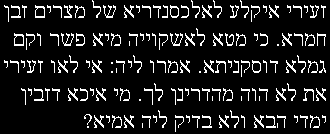
Z'eiri iqla la'Aleksandriya shel Mitsrayim. Z'van chamaraa. Ki m'taa l'ashqoyeih mayaa p'shar v'qam gamlaa duskanita. Amaru leih: "iy laav Z'eiri at la havah m'hadrinan lakh. mi iyka d'zabein midei hakhaa v'laa badeiq leih amayaa?" Zeiri came to Alexandria in Egypt. He bought a mule. When he came to give it water to drink, the charm was broken and it became a plank of wood. They said to him "were you not Zeiri, I would not return it to you. Is there anyone who buys something here and does not examine it with water?" |
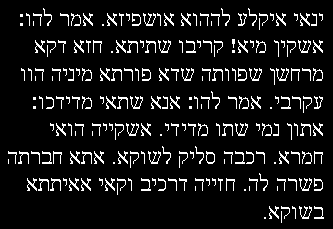
Yannai iyqla l'hahu ushpiza. Amar l'hu: "ashqyan mayaa!" Q'rivu shatitaa. Chazaa d'qaa mrachashan sifvavta, sh'daa purtaa mineih, havu aqrabei. Amar l'hu: "ana sh'tai mididkhu; atun nami sh'tu mididi." Ashqyaih hava chamaraa. Rachvah s'leiq l'shuqaa. Ataa chavertah pashrah lah. Chazyeihd'rakheiv v'qa'ei a'ittaa b'shuqaa. Yannai came to a certain inn. He said to them "give me water to drink." They offered him water which was mixed with flour. He saw the lips of the woman serving the drink moving and suspected she was a sorceress uttering an incantation. He threw a little of [the drink] to the ground and it became scorpions. He cast a spell and then said to them "I drank from yours, you drink from mine too." He gave her some to drink and she became a mule. He rode her and went to the market. Another woman came and released her, so people saw him riding on a woman in the market. |
All of this is quite funny - it is ridiculous, hence we ridicule it. Nonetheless, all three of the passages above came from the same part of Talmud Bavli: tractate Sanhedrin 67b. This is important as we get back into the more serious discussion on the possibility that the Jews recognized a bifurcation between miracle and trickery. Consider this one other passage from Sanhedrin 67b (the English is from the elucidated translation by Adin Shtainzalts):
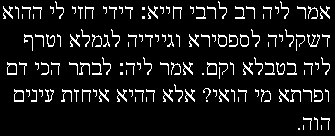
Amar leih Rav l'rabbi Hiyya: "didi chazi li hahu tayayaa d'shaqleih l'safseira v'gayydeih l'ghamla utraf leih b'tavlaa v'qam." Amar leih: "L'vatar hakhi dam ufartaa mi havai? Elaa hahi achizat enayim havah." Rav said to Rabbi Hiyya: "I myself saw a certain Arab take a sword, and cut up a camel, and then afterwards he beat on a drum and the animal stood up again and lived." Rabbi Hiyya said to him: "After the camel supposedly came back to life, did you find on the ground any traces of the blood or excretions which must have issued from the animal when it was being cut up? Rather the whole event was an optical illusion." |
So, what we get from all this is the following lesson: while at first glance aspects of the Jewish religious corpora may seem absurd (we here at the FTMecca actually consider it such), the reality is that even the ancient Talmudic sages recognized that what may seem like sorcery is really just a trick. The three ridiculous stories came within the context of a Talmudic sage warning a coreligionist that many miracles are performed via fraud.
The Story of Moses: Borrowed Material?
The fact that the Qur'an depicts Pharaoh's magicians as using trickery does not prove the text is divine, nor does it refute any borrowing theory. It is obvious that Mahdi has presupposed a number of things without giving any justification. The polemicist needs to realize that the Qur'anic version can actually be used to strengthen a theory of borrowing! The authors of the Qur'an were almost surely not reading and consulting the Bible; rather it seems more plausible that they were compiling traditions that ultimately spread from Jewish or Christian communities of some sort.
Thus, what we would have is a situation where the traditions compiled into the Qur'an spread by word of mouth, and were not a reflection of what the Bible says, but a reflection of how people understood the stories in the Bible. In such a scenario, the people's understanding of the text would be (as is always the case) colored by the hermeneutic structure built within the commentaries on the text.
So, if both the Jews and Christians interpreted the meeting of Moses and Pharaoh's magicians as being an incident where real power met false magic, it is easy to see how this same story would make its way into the Qur'an. We have already shown that the Rabbinic commentaries saw the act of turning a stick into a snake as something that any fool could do in Egypt, the home of sleight of hand, smoke, mirrors and illusion. Now, we would like to show what some Christians thought. Consider, for example, what Ambrosiaster (Pseudo-Ambrose) wrote in the fourth century:
- Jannes and Jambres were two brothers, magicians and enchanters of the Egyptians, who through phony magic thought to resist God's mighty acts. But worsted by Moses they confessed in pain from their sores that God was active in Moses.
[Ambrosiaster on 2 Timothy 3:8, as cited in Albert Pietersma, The Apocryphon of Jannes and Jambres the Magicians, (E.J. Brill, 1994), p. 30]
It seems plausible that the Qur'anic account of the magicians converting was borrowed from Judeo-Christian folklore, and it is highly probable that it borrowed the part about their magic being fraudulent! Since we're on the story of Moses and Pharaoh and the possibility that some of the material was borrowed, let us consider the Moses-Pharaoh-Banu-Isra'il story altogether, and see if there are other borrowed aspects.
First, note that when God speaks to the children of Israel in the Qur'an, there is a verse that makes mention of God holding a mountain over them when giving them the Torah. This tale of God holding a mountain over his followers does not appear in the Bible (though it does remind some Mushrikeen of the time the Hindu God Krishna held Govardhana mountain above his followers by his pinky). Regardless of the origin of this story, let us compare the verse in the Qur'an to a similar passage in Talmud Bavli. First, consider the verse from Soorat al-A'raaf 7:171...
 Wa-ith nataqnaa aljabala fawqahum kaannahu thullatun wathannoo annahu waaqi'un bihim khuthoo maa aataynaakum biquwwatin waothkuroo maa feehi la'allakum tattaqoona And (remember) when We raised the mountain over them as if it had been a canopy, and they thought that it was going to fall on them. (We said): "Hold firmly to what We have given you [i.e. the Torah], and remember that which is therein (act on its commandments), so that you may fear Allaah and obey Him." |
Now, let us take a look at what is surely the Talmudic source of this strange tale, as found in tractate Avodah Zarah 2b:
 Shekafah ha-Qadosh, Baruch Hu, har k'gigit al Yisrael v'amar lahem im atam m'qablim et ha-Torah mutav v'im lav sham t'he q'vurtkhem The Holy One, blessed is He, raised a mountain over Israel as though it were a dome. And He said to them: if you hold to the Torah all is well, but if not you will be buried here! |
It seems that the stories about Moses' people as found in the Qur'an have been influenced by Talmudic sources. Since we're on the topic of Moses' people, let us look at what Soorat al-Qasas 28:76 says about Qaaroon (Korah):
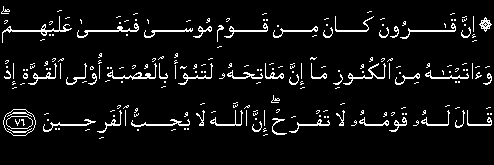 Inna Qaroona kaana min qawmi Moosaa fabaghaa 'alayhim waataynaahu mina alkunoozi maa inna mafaatihahu latanoo'u bial'usbati olee alquwwati ith qala lahu qawmuhu laa tafrah inna Allaaha laa yuhibbu alfariheena Verily, Korah was one of Moses' people, but he betrayed them and oppressed them. We gave him so many treasures that the keys would certainly weigh down a company of men possessed of great strength. His people said to him, "Do not be so arrogant; Allaah does not love those who are arrogant." |
Well, those certainly sound like some heavy keys! As it turns out, this tale about Korah's heavy keys is not found in the Bible, but it is mentioned in Talmud Bavli. The story is found in both Sanhedrin 110a and Pesachim 119a, with only minor differences. Let us take a look at the version in tractate Sanhedrin:
 V'amar Rabi Levi: "masoi sh'lsh me'ot pardot l'vanot hayu maftchot shel beyt g'nazaiv shel Qorach, V'khulhu aqlidei v'qilfei d'ghilda." And Rabbi Levi said: "The keys to Korah's treasure house was a load for 300 white mules and the keys and locks were leather." |
It is clear that the Islamic literature, be it the Qur'an or the extracanonical traditions and commentaries, show a great deal of Judeo-Christian influence. To briefly mix in the traditions, let us consider what was written by A.J. Wensinck in his article on "Fircawn" (Pharaoh) for the original Encyclopaedia of Islam:
- The Kor'anic accounts of Fircawn assume the following form in Tradition. [...] When his astrologers or priests one day told him that an Israelite would be born who was destined to rob him of his power, he commanded that every new-born Israelite boy should henceforth be slain. [...] Tradition also gives further details of the building of the towrer. [...] Gabriel came and broke the tower into three pieces with his wings; one of them fell in India, one in the Ocean and a third in the Maghrib, so high was the tower. According to Zamakhshari on Sura xxviii. 38, a piece fell on Fircawn's army and slew many of his soldiers.
[Wensinck, The Encyclopaedia of Islam, (E.J. Brill, 1927), vol. 2, p. 109]
Wensinck and other Orientalists feel that the author(s) of the Qur'an (whom many assume is Muhammad) made a mistake and got Biblical stories mixed up. Pharaoh (from Exodus), asks Haman (from Esther) to build a tower (from the tower of Babel story in Genesis). This might be possible when it is noted that the aforementioned Talmudic passage regarding Korah and other people of Israel is within the same portion that discusses the Tower of Babel (the tower is in Sanhedrin 109a while Korah is mentioned in Sanhedrin 110a). Maybe this positioning resulted in both stories being on the lips of the Jews, thus confusing those who heard version of these stories told back-to-back. There are even people who want to use the tower to wage war (against God).
Of course, all of this is minor, and to harp on this too much would be to give too much attention to a weak point. The significance of the Talmudic passage discussing the Tower goes up, however, when we take into account the fact that Islamic tradition holds that the tower was split into three pieces, and one piece fell in the Ocean, which is also mentioned in this passage. Consider the following from Sanhedrin 109a:
 Amar Rabbi Yochanan: "Mighdal, sh'lish nisraf, sh'lish nivla, sh'lish qayaym." Rabbi Yochanan said: "Regarding the tower, a third was burnt, a third sank, and a third still stands." |
While we already know that the early Muslims had access to Jewish oral traditions and legends (israa'eeliyaat), the above can lead us to believe that some had access to this passage from the Talmud. We do not, however, mean they had access to the actual text; rather they had access to people who could recite some portion of the tale. Even the ahaadeeth relate a story about Abu Huraira saying "The people of the Scripture (Jews) used to recite the Torah in Hebrew and they used to explain it in Arabic to the Muslims." [Saheeh Bukhaaree V. 6, Bk 60, No. 12; V. 9, Bk 92 No 460 & Bk 93, No. 632].
Of course, the Muslims will point out that Muhammad ordered those Muslims to ignore what the Jews say. Whether Abu Huraira really said this (we make it our position to be suspicious of any hadeeth) is irrelevant. The point here is that the strikingly similarities between the stories point to borrowing. To further drive this point home about borrowing, let us ponder what the following Qur'anic verse (Soorat al-Qasas 28:12) says about Moses as an infant:
 Waharramnaa alayhi al-maraadi'a min qablu faqaalat hal adullukum alaa ahli baytin yakfuloonahu lakum wahum lahu naasihoona And We had already forbidden foster suckling mothers for him, until [his sister] said: Shall I show you a household who will rear him for you and take care of him?" |
Now, the issue of Moses' sister asking if she should get a person to suckle Moses is straight out of the Bible (Exodus 2:7). However, if this story was being told by Jews, they would color it in light of their traditions, and this explains the part about God forbidding Moses to suckle from other foster mothers. Consider the following from Shemot Rabbah 1:25...
 Amar Ha-Qadosh, Baruch Hu, "ha-peh she'atid l'daber imi yeenaq davar tame?" The Holy One, Blessed is He, said: "Shall the mouth that will one day speak to me suckle from anything unclean?" |
Of course, some Muslims may take issue with us citing Shemot Rabbah, so we should note that the same story about God forbidding Moses to suckle from Egyptian wet nurses is also found in Talmud Bavli, the only difference being that instead of saying "with me" (imi), Sotah 12b quotes God as saying "with the divine presence" (im ha-Sh'khina). This is how Exodus 2:7 had been explained since the 2nd century.
The Qur'an: A Plurality of Sources?
That a great amount of material was borrowed seems pretty clear. All that is left now is to ponder how the story of Moses and Pharaoh should be seen in light of a theory that holds that the Qur'an is a work of multiple hands. It would seem that while the polemicist who originally brought up the story of Moses and Pharaoh saw the text as being coherent and homogenous, a closer look results in a different view.
For a quick example to start with, consider the aforementioned part where Pharaoh asks Haman to build him a tower. What exactly did Pharaoh say to Moses? According to al-Ghaafir 40:36-37, he said "O Haman! Build for me a tower that haply I may reach the roads - the roads of the heavens, and may look upon the God of Moses" [ya Hamanu, ibni lee sarhan la'allee ablughu al-asbaaba - asbaaba as-samaawaati faattalia ila ilaahi Moosa]. However, Soorat al-Qasas 28:38 has a different quote, where Pharaoh says "O chiefs! I know not that you have a god other than me, so kindle for me a fire, O Haman, to bake the mud and set up for me a lofty tower in order that I may survey the God of Moses" [ya ayyuhaa almalao maa 'alimtu lakum min ilaahin ghayree faawqid lee ya Hamanu 'ala at-teeni faijaal lee sarhan la'allee attali'u ila ilaahi Moosa].
The issue of altered conversations and differing quotes has turned up in the past, and the Muslims have not had any good answers. In our original article on the Qur'an being a work of multiple hands, we cited the conversation between Allaah and Iblees that appears in Soorat al-Hijr and Soorat Sad, as well as elsewhere. The discussion on Allaah and Iblees in the original multiple hands piece, however, did not look at the Arabic. Regardless, many times on usenet the transliterated Arabic has been used as such:
- In other words, according to the Qur'an, when Iblis refused to
prostrate before Adam (and risk committing shirk), did Allah say "ya
ibleesu ma laka alla takoona maa as-sajideena?" [Soorat al-Hijr 15:32]
or did He say "ya ibleesu ma manaaka an tasjuda lima khalaqtu
biyadayya astakbarta am kunta mina alaaleena?" [Soorat Sad 38:75]
And according to the Qur'an, what was Iblis' response? Was it "lam akun li-asjuda libasharin khalaqtahu min salsalin min hama-in masnoonin," [Soorat al-Hijr 15:33] or was it "ana khayrun minhu khalaqtanee min narin wakhalaqtahu min teenin" [Soorat Sad 38:76]?
- When the Koran says "Allah said XYZ", Allah really communicated the meaning of XYZ on the occasion in question. However, the words Allah used may have been different. For example, they may not even have been in the language of the Koran (as in the case of the speech to Moses at the Burning Bush, or the speeches to other non-Arab prophets), or in any human language at all (as was probably the case at the Creation of the world). [...] How [can it] be an exact quote, when it quotes God's communication with nonhuman beings and people who didn't even speak
Arabic?
With Pharaoh's command to Haman, we have two different versions of a statement made by a human. Here, the response above supplies us with a possible answer: Pharaoh utter this command in some ancient Egyptian dialect, not Arabic, thus the quote in the Qur'an is a mere translation. This is fine, and as we said at the outset, a translation is itself an interpretation. Still, the question still stands as to why two different loose translations (paraphrases, interpretations) of what Pharaoh said have to appear in a work that is suppose to be from the one God.
Of course, there is a great deal more to say here. To go further into the variant traditions encapsulated in the Qur'an, consider one of the versions of Moses' meeting with the magicians, as per Soorat TaaHaa 20:65-66:
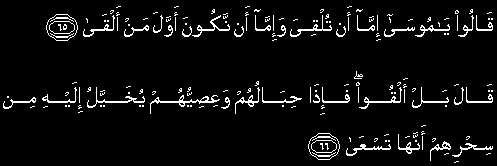 Qaaloo: "ya Moosa imma an tulqiya wa-imma an nakoona awwala man alqa?" Qaala: "bal alqoo" fa-itha hibaaluhum wa'isiyyuhum yukhayyalu ilayhi min sihrihim annaha tasaa. They said: "O Moses! Either you throw first or should we be the first to throw?" Moses said: "nay, you throw (first)!" Then behold, their ropes and their sticks, by their magic, appeared to him as though they moved fast. |
A fascinating story to be sure, but already there is a problem. In the version in Soorat ash-Shu'araa 26:42-43, Moses is quoted as saying "throw what it is that you are going to throw" (alqoo ma antum mulqoona), rather than just bal aqloo as he is quoted above. However, let us not get too excited; instead we should see what happens next, as per Soorat TaaHaa 20:67-70...
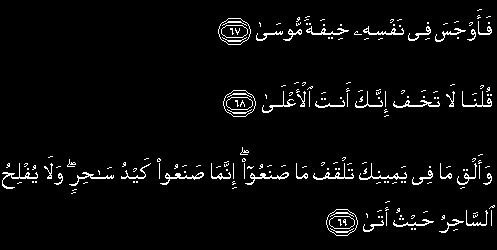 Faawjasa fee nafsihi kheefatan Moosa. Qulna la takhaf innaka anta al-aala Waalqi ma fee yameenika talqaf ma sana'oo innama sana'oo kaydu saahirin wala yuflihu as-saahiru haythu ata Faolqiya as-saharatu sujjadan qaaloo amanna bi-Rabbi Haroona wa Moosa Moses conceived a fear in himself. We said: "Fear not! Surely, you will have the upper hand. "And throw that which is in your right hand! It will swallow up that which they have made. That which they have made is only a magician's trick, and the magician will never be successful, no matter whatever amount (of skill) he may attain." So the magicians fell down prostrate. They said: "We believe in the Lord of Aaron and Moses." |
In many respects, this version from Soorat TaaHaa 20:65-70 (which you have seen above) contradicts the version in Soorat ash-Shu'araa 26:32-48. In the version above, the Magicians throw and Moses is struck with fear until God tells him to throw his own stick. In the version in ash-Shu'araa, Moses throws his stick before Pharaoh ever calls his magicians, and is already confident of what he can do come crunch time (thus there is no mention of him being afraid).
So did Moses throw his stick for the first time when he met the magicians, or had he done it before? The Muslims have a way out if they realize that Soorat al-A'raaf 7:107-122 meshes together the two stories in TaaHaa and ash-Shu'araa. This seems to be the result of a sloppy editing, to make it seem homogenous, where one of the sources pulled together two others. Regardless, the version in al-A'raaf does not mention Moses being afraid (as he has already thrown the stick and thus knew its capabilities). Furthermore, what Moses says to the magicians when he tells them to throw is still different; the version in al-A'raaf agrees with the version in TaaHaa, and both differ from ash-Shu'araa. On a side note, let it be known that only the version in ash-Shu'araa (v. 44) is aware of the magicians exclaiming "by Pharaoh's might, certainly we are the winners" (bi'izzati Fircawna, inna lanahnu al-ghaliboona).
Aside from the three versions that have been discussed (al-A'raaf, TaaHaa, ash-Shu'araa), there is a fourth version in Soorat Yoonus 10:79-83. Why four versions are needed is not clear, though probably because there is no real answer (save for the fact that the redactors saw fit to weave together four different accounts). The version in Yoonus agrees with ash-Shu'araa with regard to what Moses said when he told the others to throw their sticks. The version in Yoonus does not have God tell Moses to throw the stick as is the case in two other versions (al-A'raaf 7:117 & TaaHaa 20:68-69), and it is the only version to instead quote Moses as saying (v. 81) "what you have produced is magic, and Allaah will make it fail - Allaah does not support the transgressors' work" (ma jeetum bihi as-sihru inna Allaaha sayubtiluhu inna Allaaha la yuslihu amala al-mufsideena).
However, most striking of all is the fact that the version in Yoonus says nothing about the magicians converting. The other three versions all have the magicians prostrate themselves and declare their belief in the "Lord of Moses and Aaron" (Rabbi Moosa wa Haroona). While this statement is strikingly absent from the version in Yunus, there is one rather amazing comment that makes it stand out even more from the other three. According to Soorat Yunus 10:83, no one from the Egyptians converted:
 Fama amana li-Moosa illa thurriyyatun min qawmihi 'ala khawfin min Fircawna wamala-ihim an yaftinahum wa-inna Fircawna la'alin fee al-ardi wa-innahu lamina al-musrifeena But none believed in Moses except the offspring of his people, because of the fear of Pharaoh and his chiefs, for fear of persecution. Certainly Pharaoh was much too arrogant on earth, and one of the Musrifeen (sinners and transgressors). |
While three of the versions claim the great Egyptian magicians converted, the text above contradicts them! Due to the fact that the version in Yunus has no conversion of the Egyptian magicians, there is also no comment from Pharaoh to those magicians. In the other three versions, however, Pharaoh does have something to say, and in all three cases his comment differs. It is time to consider the three versions of what Pharaoh said (al-A'raaf 7:123-124, TaaHaa 20:71, ash-Shu'araa 26:49):
 Qaala Fircawnu amantum bihi qabla an athana lakum inna haatha lamakrun makartumoohu fee almadeenati litukhrijoo minha ahlaha fasawfa ta'lamoona Laoqati'anna aydiyakum waarjulakum min khilaafin thumma laosallibannakum ajma'eena Pharaoh said, "Did you believe in him without my permission? This must be a conspiracy you schemed in the city, in order to take its people away. You will surely find out. I will cut your hands and feet on alternate sides, then I will crucify you all." [al-A'raaf 7:123-124] |
 Qaala amantum lahu qabla an athana lakum innahu lakabeerukumu allathee 'allamakumu as-sihra falaoqatti'anna aydiyakum waarjulakum min khilaafin walaosallibannakum fee juthoo'i an-nakhli walataalamunna ayyuna ashaddu 'athaban waabqa He said, "Did you believe in him without my permission? He must be your chief; the one who taught you magic. I will surely sever your hands and feet on alternate sides. I will crucify you on the palm trunks. You will find out which of us can inflict the worst retribution, and who outlasts whom."[TaaHaa 20:71] |
 Qaala amantum lahu qabla an athana lakum innahu lakabeerukumu allathee 'allamakumu as-sihra falasawfa ta'lamoona laoqatti'anna aydiyakum waarjulakum min khilaafin walaosallibannakum ajma'eena He said, "Did you believe with him before I give you permission? He must be your teacher, who taught you magic. You will surely find out. I will sever your hands and feet on alternate sides. I will crucify you all."[ash-Shu'araa 26:49] |
The quotes are obviously quite different. So, while the general message gets across, we have to ask what was it that Pharaoh actually said. If the Muslims claim that this is merely a case of Allaah only conveying the general message of what was said, one needs to ask why it was conveyed in three different ways! It would seem that as the Muslims come up with more and more ad-hoc explanations, the most likely scenario is that the Qur'an is a compilation of stories that come in multiple versions. This seems to be the explanation for why so many stories are repeated so many times, with so many variations. It only makes sense if we understand them as being rooted in a community with different versions of the same stories, and those versions all getting woven into the same text.
Conclusion: Have They Pondered The Qur'an?
The polemicist who set this ball in motion is one who always calls for others to "ponder the Qur'an." He is wholly convinced that if the non-Muslims would just read the text thoroughly and think deeply on it, they would come to the same conclusions that he has. It should be safe to say that this brief look at the relevant passages was already more thorough than any investigation he had undertaken. This article has demonstrated that the way Mahdi portrayed the story was somewhat naive. After this analysis, the conclusion is the same as before: the Qur'an is a work of multiple hands, which pulls together variant traditions that originate with the Judeo-Christian communities.